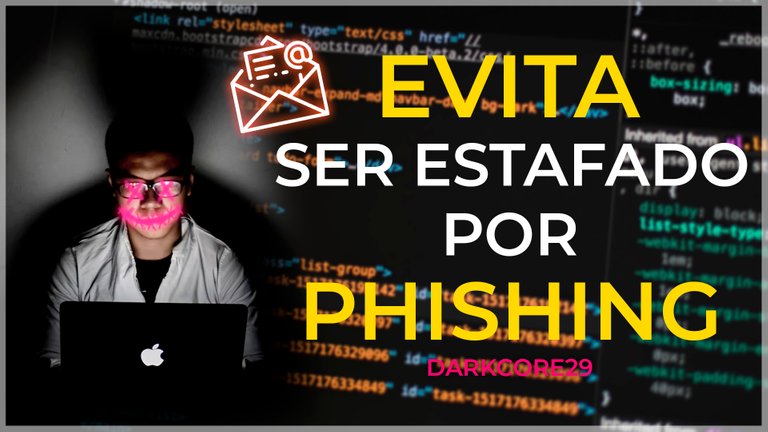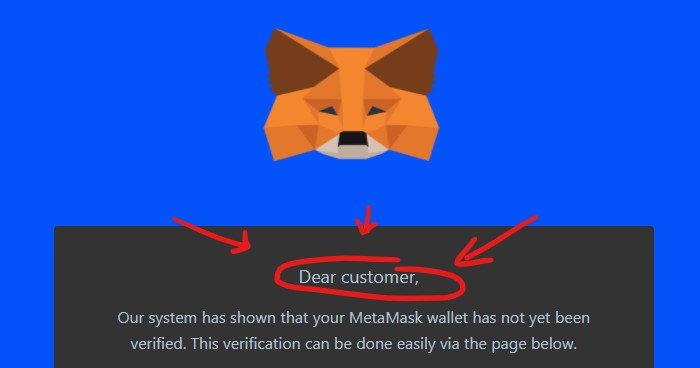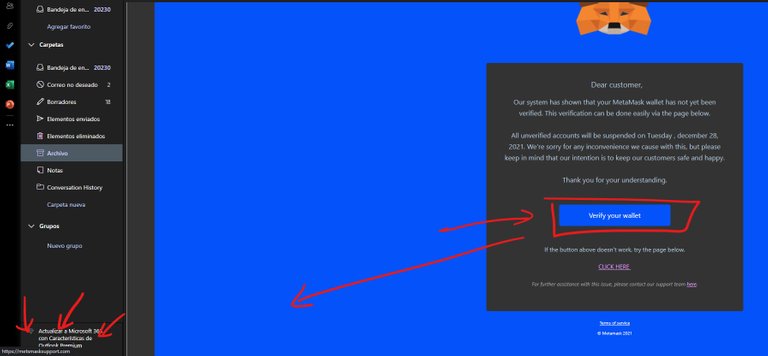
Muy buen día a todos en Hive, el día de hoy les quiero hablar de un tema muy muy importante que a todos nos concierne y que en lo personal me interesa mucho y es la Seguridad Informática, y en este caso hablaremos de algo que ya tiene varios años resurgiendo con mucha velocidad y agresividad y se trata de las Estafas por correo Phishing, y que nos puede hacer pasar muchos dolores de cabeza si no somos cuidadosos, ya que podemos perder nuestra información personal y clasificada, como información de nuestras cuentas bancarias, billeteras de criptomonedas, información delicada, etc. Así que comencemos!
Good morning everyone at Hive, today I want to talk about a very very important topic that concerns us all and that personally interests me a lot and that is Computer Security, and in this case we will talk about something that has already been resurfacing for several years with great speed and aggressiveness and it is the Phishing email scams, and that can make us spend a lot of headaches if we are not careful, because we can lose our personal and classified information, such as information from our bank accounts, cryptocurrency wallets, sensitive information, etc.. So let's get started!
Primero que todo... ¿Qué es el Phishing? - First of all... What is Phishing?
Pues según MalwareBytes Phishing es el delito de engañar a las personas para que compartan información confidencial como contraseñas y números de tarjetas de crédito. Como ocurre en la pesca, existe más de una forma de atrapar a una víctima, pero hay una táctica de phishing que es la más común. Las víctimas reciben un mensaje de correo electrónico o un mensaje de texto que imita (o “suplanta su identidad”) a una persona u organización de confianza, como un compañero de trabajo, un banco o una oficina gubernamental. Cuando la víctima abre el correo electrónico o el mensaje de texto, encuentra un mensaje pensado para asustarle, con la intención de debilitar su buen juicio al infundirle miedo. El mensaje exige que la víctima vaya a un sitio web y actúe de inmediato o tendrá que afrontar alguna consecuencia.
Si un usuario pica el anzuelo y hace clic en el enlace, se le envía a un sitio web que es una imitación del legítimo. A partir de aquí, se le pide que se registre con sus credenciales de nombre de usuario y contraseña. Si es lo suficientemente ingenuo y lo hace, la información de inicio de sesión llega al atacante, que la utiliza para robar identidades, saquear cuentas bancarias, y vender información personal en el mercado negro.
A simples rasgos, se trata de la suplantación de identidad por parte de un cybercriminal haciéndose pasar por algún servicio o contacto que 'deberías de conocer' en el que te plantean una situación de urgencia de seguridad y que debes atender dando tus credenciales privadas para 'verificar que eres tu' y hacerse con tu información
Well according to MalwareBytes Phishing is the crime of tricking people into sharing sensitive information such as passwords and credit card numbers. As with fishing, there is more than one way to trap a victim, but there is one phishing tactic that is the most common. Victims receive an email or text message that mimics (or "impersonates") a trusted person or organization, such as a co-worker, bank or government office. When the victim opens the email or text message, he or she encounters a message designed to scare him or her, with the intent to undermine his or her judgment by instilling fear. The message demands that the victim go to a website and act immediately or face some consequence.
If a user takes the bait and clicks on the link, they are sent to a website that is an imitation of the legitimate one. From here, he is asked to register with his username and password credentials. If you are naive enough and do so, the login information gets to the attacker, who uses it to steal identities, loot bank accounts, and sell personal information on the black market.
In simple terms, this is identity theft by a cybercriminal posing as a service or contact that you 'should know' in which you are presented with an urgent security situation that you must deal with by giving your private credentials to 'verify that it is you' and get hold of your information.
Y ¿Cómo puedo identificarlo? - How can I identify it?

En este caso usaremos como ejemplo un supuesto correo por parte de Metamask (Servicio el cual si uso) que a pesar de ser bastante convincente por un lado, por el otro tenía muchos fallos y eso los delató.
In this case we will use as an example an alleged email from Metamask (Service which I do use) which despite being quite convincing on the one hand, on the other hand had many flaws and that gave them away.
Pues es aquí donde quiero aprovechar que hace poco me llegó uno de estos correos (Y a decir verdad bastante convincente) y quiero compartir con ustedes como identificar un correo de este tipo y algunas experiencias que he tenido.
Algo muy común en este tipo de Correos es que nunca te llaman por tu nombre, sino por tu correo electrónico o con 'Estimado Señor, Señora, Cliente, Usuario', y todos sabemos que si se tratase de un banco nos llamarían por nuestro nombre verdadero, como vemos en la imagen se refieren a mi como 'Customer/Cliente' y no por mi nombre, lo cual ya comienza a levantar sospechas. Además, el dato mas obvio, METAMASK NO ENVÍA CORREOS!
Well, this is where I want to take advantage of the fact that I recently received one of these emails (And to tell the truth quite convincing) and I want to share with you how to identify an email of this type and some experiences I have had.
Something very common in this type of mail is that they never call you by your name, but by your email address or with 'Dear Sir, Madam, Customer, User', and we all know that if it were a bank they would call us by our real name, as we see in the image they refer to me as 'Customer' and not by my name, which already begins to raise suspicions. In addition, the most obvious fact, METAMASK DOES NOT SEND MAIL!

Algo muy común también es que no tengan foto de perfil (no siempre) o la tengan muy distorsionada o de baja calidad, sabemos que si recibimos un correo de Netflix su foto será la característica 'N' roja con fondo negro, no una 'N' genérica, así como también que el remitente de los correos debe de parecer un mail oficial, por ejemplo, sabemos que un correo de Amazon se vería algo así como 'support@ amazon.com' 'no-reply@ amazon.com' o similar, no como 'asdh78fre78@fhshj.com' o parecidos, porque sí, hay correos así, en mi caso el correo no tenía foto de perfil por lo cual me hizo dudar mas, PERO, algo que si parecía fiable era la dirección de correo del remitente, ya que si se fijan, parece bastante normal y oficial, pero todavía era muy temprano para confiar, así que proseguimos.
Something very common is also that they don't have a profile picture (not always) or they have it very distorted or of low quality, we know that if we receive an email from Netflix its picture will be the characteristic red 'N' with black background, not a generic 'N', and also that the sender of the emails must look like an official mail, for example, we know that an email from Amazon would look something like 'support@ amazon. com' 'no-reply@ amazon.com' or similar, not like 'asdh78fre78@fhshj.com' or similar, because yes, there are emails like that, in my case the email did not have a profile picture which made me doubt more, BUT, something that did look reliable was the sender's email address, because if you look at it, it looks quite normal and official, but it was still too early to trust, so we continued.

Ahora analizando un poco el contenido de el correo me intentan decir que mi cuenta de Metamask no ha sido verificada y por lo tanto me dan una fecha límite para verificarla, de no hacerla la cerraran, y que me dicen que puedo verificarla dando click en el botón del correo el cual me llevará a una pagina de validación y que 'se preocupan por su clientela' (Tan lindos y preocupados verdad?).
Pues ya aquí vamos muy mal, ya que para usar la Billetera de Metamask no hay que hacer alguna verificación, solo guardas las palabras clave que te dan al momento de crear tu cuenta, mas nada, pero claro, si eres un usuario menos experimentado puedes caer muy fácil en la desesperación y caer en su trampa. Y tal cual es en este ejemplo puede pasar con uno supuestamente de algún banco, de Amazon, Google, YouTube, Hive, etc. Incluso haciéndose pasar por algún conocido (Por no mencionar a ese típico jeque arabe moribundo que quiere donarte parte de su fortuna, por favor, hay que tener lógica).
Now analyzing a little the content of the email they try to tell me that my Metamask account has not been verified and therefore they give me a deadline to verify it, if I don't do it they will close it, and they tell me that I can verify it by clicking on the button in the email which will take me to a validation page and that 'they care about their customers' (So cute and concerned right?).
Well here we go very wrong, because to use Metamask Wallet you don't have to do any verification, you just save the keywords they give you when you create your account, nothing else, but of course, if you are a less experienced user you can easily fall into despair and fall into their trap. And as it is in this example, it can happen with one supposedly from a bank, Amazon, Google, YouTube, Hive, etc. Even pretending to be someone you know (Not to mention that typical dying Arab sheikh who wants to donate part of his fortune to you, please, you have to be logical).
Bueno, en este punto debemos detenernos a pensar, si ya lo identificamos como una estafa o no, por ejemplo, a mi me han llegado correos de que supuestamente tengo una deuda por un juego de la Apple Store cuando ni siquiera tengo un iPhone JAJAJAJA, es algo risorio, pero bueno, supongamos que es de un servicio que actualmente usemos, y quizás suene convincente, Algo que siempre recomiendo es que vayan directamente a la pagina oficial del servicio en cuestión y desde ahí intenten arreglar el problema y no desde el correo, así se evitan el posible phishing, pero bueno, supongamos que nos da flojera escribir la pagina web oficial del servicio (en serio, no seas flojo, es por seguridad) y quieres darle click a ese gran botón que te ponen en el mensaje, NO, antes de dar click haz esto, coloca tu cursor por encima del botón para que muestre el URL/Link de la pagina a la cual quiere llevarte (Este aparece en la esquina inferior izquierda de tu pantalla) (Recuerdo que esto es válido hacerlo en una PC).
Se ve pequeño pero debemos de fijarnos muy bien en esto, busca unos lentes si los necesitas, porque en caso de ir a la pagina oficial no debería de haber fallos ortográficos en ese link ¿verdad?, por ejemplo, si es de Amazon debería de llevarnos a un link que comience con www.amazon.com, no .net o anazon.com, y derivados, son pequeños detalles que cuesta ver en un principio pero que nos puede llevar a un desenlace fatal.
Well, at this point we must stop to think, if we already identify it as a scam or not, for example, I have received emails that supposedly I have a debt for a game from the Apple Store when I do not even have an iPhone HAHAHAHAHAHA, is something laughable, but well, suppose it is a service that we currently use, and perhaps it sounds convincing, something I always recommend is to go directly to the official website of the service in question and from there try to fix the problem and not from the mail, this way you avoid the possible phishing, but well, let's suppose that we are lazy to write the official web page of the service (seriously, don't be lazy, it is for security) and you want to give click to that great button that they put you in the message, NO, before giving click do this, place your cursor over the button so that it shows the URL/Link of the page to which it wants to take you (This appears in the left inferior corner of your screen) (I remember that this is valid to do it in a PC).
It looks small but we must pay attention to this, look for some glasses if you need them, because in case of going to the official page there should not be spelling mistakes in that link, right? for example, if it is from Amazon it should take us to a link that begins with www.amazon.com, not .net or anazon.com, and derivatives, are small details that are hard to see at first but that can lead us to a fatal outcome.

¿No puedes verlo bien?, vamos a hacerlo mas grande - Can't you see it well, let's make it bigger.

Si no eres muy cuidadoso es muy fácil caer ya que la forma de las letras es muy similar, como puedes ver no dice metamasksupport.com sino metsmasksupport.com, pequeño pero importantísimo cambio es la diferencia entre una web oficial y un clon para robarte la información, si entráramos veríamos una pagina clon, estéticamente igual, pero que está controlada por un tercero, también recuerden solo entrar a paginas que tengas HTTPS al inicio, ya que estas cuenta con una conexión cifrada por lo tanto es mas segura, en este caso el delincuente se aseguró de que su clon también lo tuviera para poder dar mas confianza pero ya logramos ver que es un clon.
If you are not very careful it is very easy to fall because the shape of the letters is very similar, as you can see does not say metamasksupport.com but metsmasksupport. com, small but very important change is the difference between an official website and a clone to steal your information, if we would enter we would see a clone page, aesthetically the same, but it is controlled by a third party, also remember to only enter pages that have HTTPS at the beginning, as these have an encrypted connection so it is safer, in this case the offender made sure that his clone also had it to give more confidence but we can see that it is a clone.
También quiero agregar que si usan un cliente de correo instalado en su PC como Outlook u otro, jamás abran esta clase de correos desde ahí, o nunca descarguen supuestas facturas o archivos que puedan tener estos correos sospechosos ya que pueden contener virus, gusanos, troyanos, keyloggers, ransomware, etc que les puede hacer pasar muy mal rato, la principal línea de defensa es el uso del sentido común, eviten caer en este tipo de estafas y tengan mucho cuidado ya que cada vez están mas presentes este tipo de ataques con el auge de criptomonedas y nuevos proyectos NFT.
I also want to add that if you use an email client installed on your PC such as Outlook or other, never open this kind of emails from there, or never download supposed invoices or files that may have these suspicious emails as they may contain viruses, worms, Trojans, keyloggers, ransomware, etc. that can give you a very bad time, the main line of defense is the use of common sense, avoid falling into this type of scams and be very careful as they are increasingly present such attacks with the rise of cryptocurrencies and new NFT projects.
Todo el contenido de este post es de mi autoría - All the content of this post is authored by me.
▶️ 3Speak


Muy buen contenido amigo. otro peligro son los keyloggers yo evito usar otros dispositivos soy muy paranoico con eso. :) seria genial un post sobre ese tema en específico saludos
!PIZZA
Muchas gracias amigo!, Pues si, últimamente abundan estos métodos de ciberdelincuencia, en especial los Ransomware, y claro, pienso tocar esos temas pronto para educar un poco mas acerca de la seguridad en la web, saludos!
The rewards earned on this comment will go directly to the person sharing the post on Twitter as long as they are registered with @poshtoken. Sign up at https://hiveposh.com.
PIZZA Holders sent $PIZZA tips in this post's comments:
@sephiwolf(1/5) tipped @darkcore29 (x1)
Join us in Discord!
Congratulations @darkcore29! You have completed the following achievement on the Hive blockchain and have been rewarded with new badge(s):
Your next target is to reach 30 posts.
Your next target is to reach 100 replies.
You can view your badges on your board and compare yourself to others in the Ranking
If you no longer want to receive notifications, reply to this comment with the word
STOPTo support your work, I also upvoted your post!
Check out the last post from @hivebuzz:
¿Y si algún día de verdad un jeque moribundo nos quiere donar su herencia? Jajaja mentira, excelente post, gracias por tomarte el tiempo de compartirlo para nosotros 😁👍
Jajajaja, bueno, no hay que perder la fe, pero igual estar muy atentos, hay casos donde es phishing es mas sofisticado y se toman el tiempo para elaborarlo bien, así que muy pendientes con eso, y muchísimas gracias! Estamos para compartir conocimientos! Saludos!😁